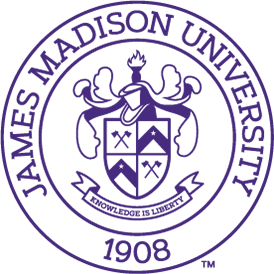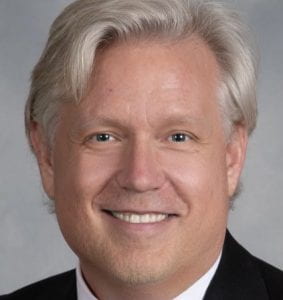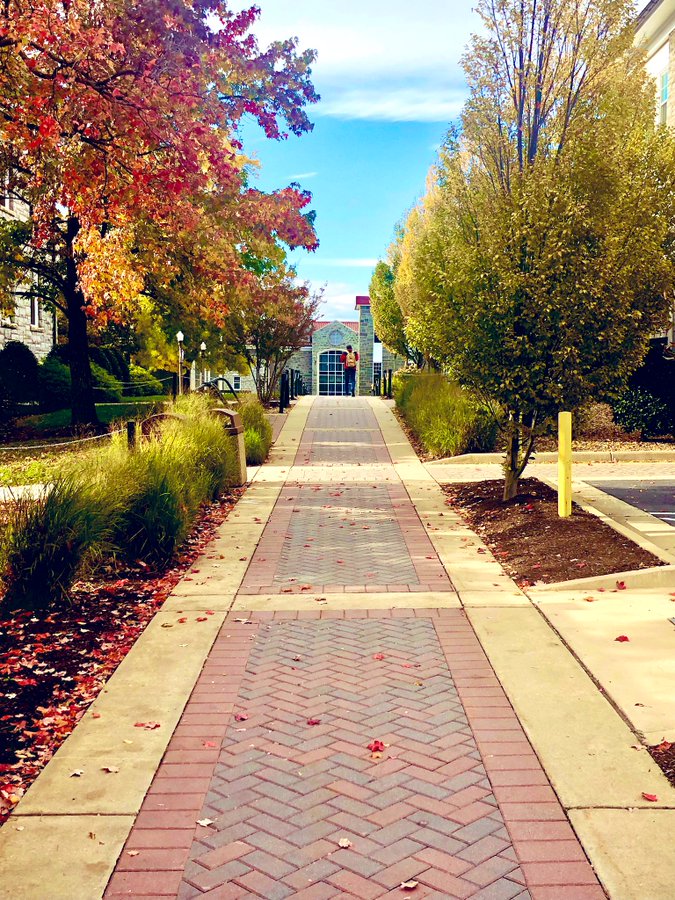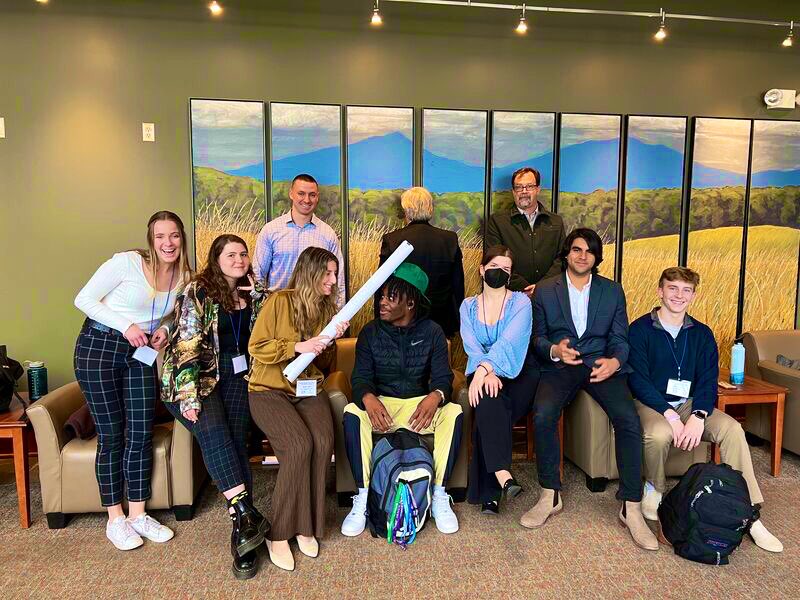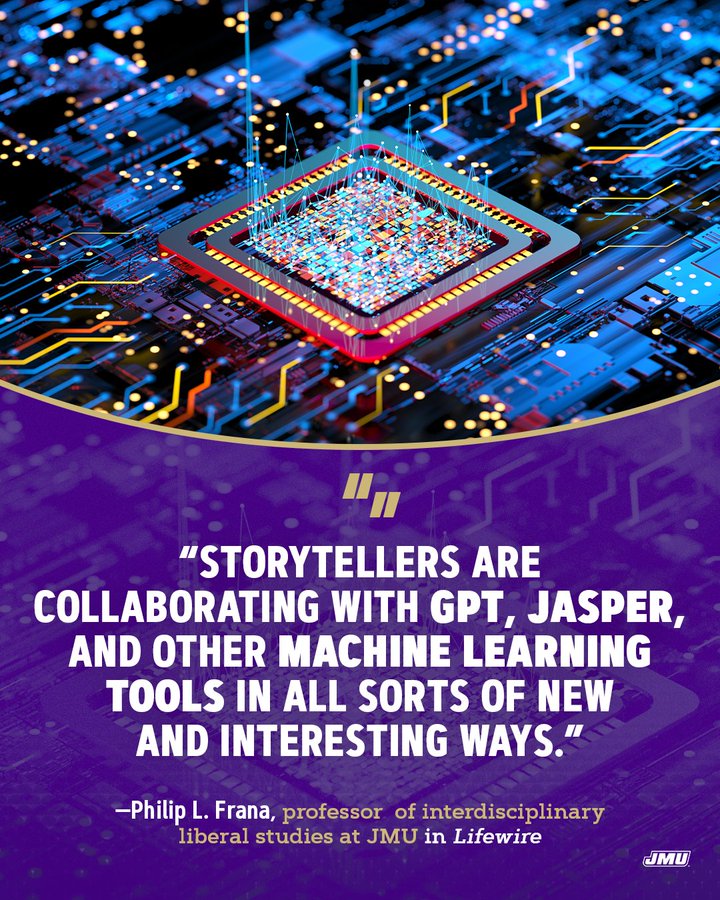PHILIP L. FRANA
Philip L. Frana, Ph.D.
James Madison University
Departments and Programs: Interdisciplinary Liberal Studies; Independent Scholars; Honors College
Media contact: Eric Gorton, gortonej@jmu.edu
Looking for a speaker? I enjoy giving lectures on AI topics of general interest. Here are some recent talks.
Areas of expertise:
- artificial intelligence, computing, and digital culture
- information and software studies
- science and technology policy
- creativity and innovation
- individualized, interdisciplinary, and honors education
- oral history research
Brief bio: Philip Frana is professor of Interdisciplinary Liberal Studies and Independent Scholars at James Madison University. His current scholarly interests focus on the social and cultural aspects of artificial intelligence and information technologies. He is editor and contributor to the Encyclopedia of Artificial Intelligence and past project director at the Charles Babbage Institute for Computing, Information & Culture. Areas of expertise include software and information studies, computing and culture, creativity, and individualized and interdisciplinary education.
Long bio: Philip Frana’s scholarship and teaching at James Madison University focuses on interdisciplinary approaches to artificial intelligence, health informatics, and digital technologies. He is editor and contributor to the Encyclopedia of Artificial Intelligence: The Past, Present, and Future of AI and advisory board member and VR education team leader for the Museum of Science Fiction. He is also digital technology specialist to the GeoTech Center of the Atlantic Council, an international affairs think tank in Washington, DC. He received a doctorate in the history of technology, science & medicine from Iowa State University, and a bachelor’s degree in history and economics from Wartburg College. He served for several years as software history project director for the Charles Babbage Institute for Computing, Information & Culture at the University of Minnesota. He is past associate dean of the JMU Honors College and past director of undergraduate research in the Norbert O. Schedler Honors College at the University of Central Arkansas.
More info:
LinkedIn | Bluesky | Twitter | Post | Google Scholar | SelectedWorks | ORCID ID
Research & Scholarship
“Worlds We Make, Worlds That Make Us: Reflections on Artificial Intelligence and Virtual Reality in Higher Education,” Journal of Science Fiction, forthcoming.
This essay reflects on how artificial intelligence and virtual reality extend humanity’s oldest practice: world-building through story. From the campfire to the circuit, our inventions mirror our myths, revealing both wonder and danger. AI and VR promise new ways of learning but risk turning education into spectacle and imitation. Students and faculty must use these tools as companions to reflection, not replacements for it. Higher education’s challenge is to keep imagination, dialogue, and judgment at the center of technological immersion. Ultimately, the worlds we make—digital or real—reshape us, demanding wisdom as much as innovation.
“Teaching AI Literacy through STS, Rhetoric, and Ethical Reasoning,” Journal of the National Collegiate Honors Council, forthcoming.
Building on Dotter and Bryan’s call for productive troublemaking, we describe a team-taught interdisciplinary honors course that integrates Science, Technology, and Society studies, rhetorical analysis, ethical reasoning, and artificial intelligence policy. Rather than framing AI as a threat, our course invites students to experiment critically with AI technologies. Students develop competencies by analyzing AI as a social and subjectivity-shaping phenomenon; writing policy briefs; producing rhetorical analyses of science fiction; and completing self-paced AI literacy modules. We argue that honors education is uniquely positioned to model responsible and human-centered uses of intelligent systems, and to cultivate graduates who can both use and critically interrogate the AI tools that are shaping our increasingly algorithm-saturated world.
Encyclopedia of AI: The Past, Present, and Future of Artificial Intelligence, Robotics, and Automation, 2nd edition, expanded (forthcoming, London: Bloomsbury Press, 2026).
Using language and terminology accessible to a non-specialist audience, this volume helps users understand the reasons generative and traditional AI development has both spirited defenders as well as alarmed critics; explains theories and innovations that drive AI research and debate; and gives readers the information they need to make their own informed judgment about the promise and peril of this technology. We are adding entries on rapidly developing areas of generative AI, especially key concepts, underlying technologies, specific applications, and contributing disciplines.
“What Policy Makers Need to Know About Quantum Information Science,” Atlantic Council Issue Brief, forthcoming.
Quantum information science (QIS) is a budding interdisciplinary field located at the convergence of computer science, mathematics, engineering, quantum physics, and philosophy. Experimental devices and techniques have already arisen from QIS—for example, quantum computers, quantum cryptography, and quantum teleportation—and other advances such as quantum artificial intelligence are on the horizon. But QIS is also valuable as a sandbox for learning more about the fundamental nature of quantum mechanics.
“The Political Economy of Quantum AI,” in Convergence: Artificial Intelligence and Quantum Computing—Applications and Use Cases, vol. 2, edited by Greg Viggiano, forthcoming from Museum of Science Fiction Press.
The race to make and use quantum artificial intelligence (QAI) technologies will dramatically reshape the complex political and economic landscapes of the contemporary world. This chapter explores the political economy of QAI, including an examination of the opportunities and challenges facing government leaders, policymakers, and corporate executives who will need to navigate this rapidly evolving terrain. The post-Newtonian turn in the social sciences—utilizing quantum concepts such as entanglement, non-locality, superposition, and complementarity—has fostered new ideas and hypotheses about all sorts of phenomena that might be amenable to study using QAI: voter behavior, economic analyses, virtual currencies, and geopolitical decision-making.
“Quantum AI in Healthcare,” in Convergence: Artificial Intelligence and Quantum Computing—Applications and Use Cases, vol. 2, edited by Greg Viggiano, forthcoming from Museum of Science Fiction Press.
Quantum AI holds significant promise as a ground-breaking approach to complex healthcare problems. Healthcare can benefit from leveraging the enormous power of quantum computing and algorithms to process massive and exponentially increasing quantities of medical data. Over the past decade, scientists have begun proposing quantum computing applications for precision medicine, personal health monitoring, medical imaging, drug discovery, disease diagnosis, clinical trials, epidemiology, medical data privacy and security, and healthcare system optimization. In this chapter, we give an overview of current thinking about quantum AI in healthcare, projections for its future use, and describe some of the ways in which it could transform the general landscape of the healthcare industry.
“Iowa’s Forgotten Pandemic: Cold War Realities and the 1957–1958 Asian Influenza Outbreak,” in Annals of Iowa, forthcoming.
What makes influenza significant to Iowa is its role in advancing viral epidemiology in the twentieth century and its unusual position in exacerbating the 1957–1958 pandemic. Iowa scientists studying influenza outbreaks during the early to mid-twentieth century focused on understanding the causative agent of the disease, its transmission, and methods for prevention and treatment. This research laid the groundwork for mid-century advancements in our understanding of infectious diseases and public health measures to control them. A superspreader event in Iowa in the summer of 1957 had significant implications for national public health. The 1957 Asian influenza pandemic was not the first time public health authorities fought the flu or prepared a vaccine to fight the disease, but it represented a first major test of an organized national public health response in the United States.

“The Digital Devil,” in The Routledge History of the Devil in the Western Tradition (New York: Routledge, 2025), 499-520.
The ‘digital devil’ is a compelling metaphor for the hidden computer systems that have become integral to our daily lives. Computing has transformed the way we work, play, communicate, and carry out business. It reduces uncertainties and accelerates modern life. This chapter delves into the omnipresent influence of demons that inhabit the computers, information flows, and software we have come to depend on over the last half century. It explores the intricate ways in which these ethereal entities have intertwined with, influenced, and been transformed by computer professionals and the very fabric of our technological age.
“Professor Philip L. Frana Talks with Internet Pioneer Mark P. McCahill,” The Nexus (Chinese), January 25, 2025.
Mark P. McCahill, assistant director of academic and distributed computing services at the University of Minnesota, looks back on his journey to technology. He led the team that developed the popular information system Gopher, which dramatically changed the way information is organized and shared on the Internet. McCahill also shares his work on multiple projects, including POPmail, Gopher VR, Forms Nirvana, an electronic grant management system, and the University of Minnesota portal. These projects demonstrate his important contributions to the development and application of information technology.
“Creating a Diverse Honors Faculty Through Collaborative Relationships within the Community and the University,” Honors in Practice 20 (2024): 263–277.
A well-structured and diverse faculty is crucial for the success of an honors college, as it fosters academic excellence, a lively and experiential learning environment, and broad-based and inclusive university conversations. Honors colleges and programs have difficulty making proactive roadmaps and sustainable strategies where there is limited faculty continuity, an insufficient range and representation of viewpoints, and too many distractions from the core mission of delivering exceptional educational experiences. In this article, we argue for more fulsome support of affiliate and adjunct faculty, recognizing their pivotal role in addressing the diversity, inclusivity, and integrative needs of honors programs and colleges.
“Assessing Smart Nation Singapore as an International Model for AI Responsibility,” International Journal on Responsibility 7, no. 1 (2024): 1-30.
While AI and other smart technologies greatly contribute to material aspects of well-being, there are concerns that they threaten quality of life in Singapore, where self-reports suggest the workforce is among the unhappiest in the world. In Singapore, smart technology and digital governance have freed up labor for activities where human empathy and understanding are unique and indispensable, but also threaten to undermine human dignity and accountability. This paper undertakes a comprehensive assessment of Singapore as an international model for AI responsibility from the perspective of the history and philosophy of technological governance.

“How Honors Advising is Different,” introductory chapter in Advising for Today’s Honors Students (Lincoln, NE: National Collegiate Honors Council, 2023), 3-30.
The introduction to a book on honors advising. The introduction provides an overview to a number of advising philosophies and techniques commonly used in the honors context. Crucially, the essay considers how each of these approaches must be adapted to the unique needs of honors students. A concise and practical resource for anyone beginning their honors advising journey and a reaffirming manifesto to experienced practitioners, the essay previews many of the theoretical and philosophical approaches to advising that feature in the rest of the book.
“Honors Mindsets and Motivations,” in Advising for Today’s Honors Students (Lincoln, NE: National Collegiate Honors Council, 2023), 55-71.
A chapter of a new honors advising monograph which presents the expectancy-value-cost model together with sample advising scenarios derived from real experience with students in the James Madison University Honors College.
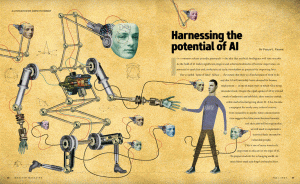
“Harnessing the Potential of AI,” Madison: The Magazine of James Madison University 46, no. 3 (Fall 2023): 32–39.
It’s a common refrain in media portrayals — the idea that artificial intelligence will take our jobs. As the field of AI makes significant progress and achieves landmarks of historic importance, its potential to spark fear and confusion can easily overshadow its potential for improving lives. Despite the rapid uptake of AI by a broad swath of industries and subfields, there remains considerable media fearmongering about AI. It has become a scapegoat for nearly every cultural anxiety, from inequality to apathy. To prepare students for a changing world, we must foster truth and dispel unfounded fears.
“What Policy Makers Need to Know About Artificial Intelligence,” Atlantic Council Issue Brief (June 29, 2023).
“Demographics, Inc., Computerized Direct Mail, and the Rise of the Digital Attention Economy,” IEEE Annals of the History of Computing 45, no. 2 (April-June 2023): 15–28.
This article chronicles the origins of mechanized and computerized direct mail, mass personalized marketing, and the role of these technologies in the development of the digital attention economy. It includes an account of the first several decades of Demographics, Inc. that became one of the largest and most profitable database marketing companies in the world. Headquartered in Conway, Arkansas, Demographics developed LOFS, a market-leading proprietary data processing application for maintaining and renting lists, and personalizing direct mail for political, consumer, and business marketing campaigns.
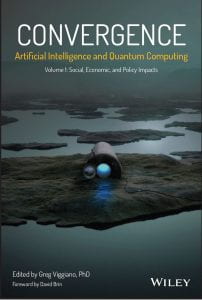
“Quantum Planet Hacking: Quantum AI and Climate Change,” in Convergence: Artificial Intelligence and Quantum Computing—Social, Economic, and Political Impacts, vol. 1, edited by Greg Viggiano (Hoboken, NJ: Wiley, 2023), 93–109.
Scientists are using data, algorithms, and artificial intelligence to pinpoint and develop solutions to human-caused environmental challenges. Quantum AI platforms are a key component of the burgeoning green economy, which will move us from a take-make-waster linear model of growth to one that is circular, regenerative, and focused on society-wide benefits.
“What is Quantum Computing?” in Convergence: Artificial Intelligence and Quantum Computing—Social, Economic, and Political Impacts, vol. 1, edited by Greg Viggiano (Hoboken, NJ: Wiley, 2023), 221–238.
Quantum computing is a fundamentally unique way of processing information and calculating solutions to problems. Quantum computers are capable of operating in an extremely large number of states simultaneously, while classical computers can operate in only one state at any given moment. Because they work in a different way, many scientists believe that these quantum computers can deliver exponential speedups and solve problems that elude classical computers.
“What is Artificial Intelligence?” in Convergence: Artificial Intelligence and Quantum Computing—Social, Economic, and Political Impacts, vol. 1, edited by Greg Viggiano (Hoboken, NJ: Wiley, 2023), 239–246.
Artificial intelligence is a rapidly evolving field rooted in computing and the cognitive sciences. As an academic field, AI involves research on intelligent agents that perceive and respond to environments like cyberspace or the physical world to achieve specific goals. Siri and Alexa chatbots are examples of intelligent agents, as are the sensor and actuator-based systems implanted in Roomba vacuum cleaners and Tesla cars. More generally, AI encompasses both real and fictional efforts to imitate human (and animal) intelligence and creativity with machines and code.
“Using Algorithmic Imaginaries and Uncanny Pedagogy to Facilitate Interdisciplinary Research and Digital Scholarship,” Honors in Practice 18 (2022): 81–95.
An interdisciplinary honors course titled “Minds, Machines, and Meaning” incorporates the notion of the algorithmic imaginary, which explains how people make use of algorithms to create new information infrastructures and communities and how these algorithms shape us in turn. Describing a culminating writing assignment in speculative research, I explain how this course facilitates interdisciplinary research while fostering student and faculty growth, and reflect on the possibility of its future variation, the uncanny valley of algorithmic anti-humanism.
“Battling Smallpox,” Iowa Public Broadcasting Service, 2022.
Part of an Iowa Public Broadcasting Service series on the history of healthcare. One of the most contagious diseases of this period in history, smallpox was a killer. Smallpox affected Iowans of all ages. Those who survived could be left blind or disfigured by ugly scars called pockmarks. Few diseases were so destructive to humans. It was a disease with no cure. The word “smallpox” brought fear to Iowans as the disease could easily spread through whole communities.
This authoritative reference work provides readers with a complete overview of artificial intelligence, including its historic development and current status, existing and projected AI applications, and present and potential future impact on the United States and the world. The CHOICE review says: “[The book] can be read from cover to cover. These thought-provoking articles draw engagement. Frana and Klein successfully demonstrate the remarkable accomplishments of AI; its future appears bright. Summing Up: Highly recommended. All readers.”
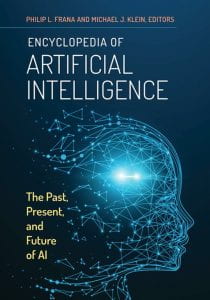
“Telematics and the Early History of International Digital Information Flows,” IEEE Annals of the History of Computing 40, no. 2 (April–June 2018): 32–47.
The origins of telematics and the early history of international information flows is recounted. As a result of post-World War II efforts to encourage the free flow of data in the service of peacemaking and economic growth, the computer utility, distributed data processing services, and the post-industrial information society were born. Hand in hand with these developments emerged political and technical difficulties of data protection, network and national sovereignty, and identity. Interconnection and high-velocity information sharing encouraged culturally ingrained expectations of flow at work and in life. It also destabilized the national security, international relationships, and global commerce.
“Best Practices in Two-Year to Four-Year Honors Transfers,” Honors in Practice 13 (2017): 9–20.
James Madison University and Northern Virginia Community College teamed up in April 2014 to build a memorandum of understanding (MOU) between their respective four-year and two-year honors programs. This MOU is the basis for the continued work between these two institutions to collaborate and find research to assist other interested honors deans, directors, and coordinators in creating similar MOUs and demonstrating the importance of such agreements in higher education.
“An Interview with Stephen A. Cook,” Communications of the ACM 55, no. 1 (January 2012): 41–46.
A condensed version of an oral history interview with A.M. Turing Award recipient and ACM Fellow Stephen A. Cook, considered one of the originators of computational complexity theory.
“An Interview with Edsger W. Dijkstra,” Communications of the ACM 53, no. 8 (August 2010): 41–47.
A condensed version of an oral history interview with A.M. Turing Award recipient Edsger W. Dijkstra, the first formally educated computer programmer in Europe, inventor of Dijkstra’s algorithm, and originator of structured programming.
“Implementing Wikis in Honors Courses,” Journal of the National Collegiate Honors Council 10, no. 2 (Fall/Winter 2009): 53–56.
My preference is to teach -oriented honors classes grounded in constructivist epistemology, where knowledge is assembled and transformed by students working with resource persons. In such courses, innovations emerge from collaboratively organized projects, and students accept primary leadership roles. Until the introduction of new digital technologies, this kind of collaborative process was limited in time and space to one semester, the confines of a classroom, and the class members themselves. The process was restricted and incomplete. Wikis provide a means to break away from these restrictions.
“Medicine and the Family in the 1930s,” in Great Depression: Peoples and Perspectives, edited by Hamilton Cravens (Santa Barbara, CA: ABC–CLIO, 2009), 65–84.
The Great Depression challenged both the physical and mental health of Americans. Family practice in the Depression was above all a down-to-earth cottage trade. The doctor expected to serve his injured patients in a manner paralleling the local garageman. The auto made available for urgent care. He mastered all branches of the medical arts, including infectious disease, obstetrics, pediatrics, surgery, and radiology. He was a healer of mental as well as physical ailments. In complicated cases, he became a general contractor supervising the other health-building trades: nurses, social workers, and specialists. In his focus on personality and deportment, he saw the individual as a whole person, as a part of a family, and in turn, the greater community. And finally, safety and security formed his chief objectives–in a time and place characterized by neither one.
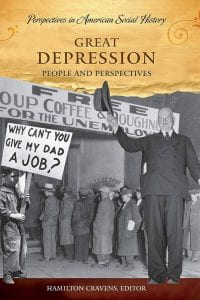
“Charles V. Chapin (1856–1941),” “Joshua Lederberg (1925– ),” “Mark I,” “Norbert Weiner (1894–1964),” and “SAGE (Semi–Automatic Ground Environment),” in Research and Discovery: Landmarks and Pioneers in American Science, ed. Russell Lawson (Armonk, NY: M. E. Sharpe, 2008).
This encyclopedia is an overview of the history of science in America from colonial times to the present. Organized alphabetically within scientific discipline, the set is divided into fourteen sections that include overview essays tracing the historical development of the specific discipline in a cultural and social context.
“Honors 2025: The Future of the Honors College,” Honors in Practice 4 (2008): 29–33.
As we attempt to foresee the future, we recognize that the increase in the number of honors colleges over the past decade appears to be an accelerating trend. We base our predictions on the continuation of this trend and on our need as honors administrators to anticipate and welcome the multiple impacts it will have on current and future honors colleges. We have selected four connected areas as the focus of our consideration: mission; curriculum; assessment and accreditation; and recruiting.
“Automobiles,” “Automotive Technology,” “Canal Boats,” “Locks,” “Minneapolis–St. Paul International Airport,” “Orville Wright,” and “Wilbur Wright,” in The American Midwest: An Interpretive Encyclopedia (Bloomington: Indiana University Press, 2006).
This first-ever encyclopedia of the Midwest seeks to embrace this large and diverse area, to give it voice, and help define its distinctive character. Organized by topic, it encourages readers to reflect upon the region as a whole. There are portraits of each of the region’s twelve states, followed by entries on society and culture, community and social life, economy and technology, and public life.
“Encryption and Code Breaking” and “Computer-Aided Control Technology,” in Encyclopedia of 20th-Century Technology, ed. Colin A. Hempstead (New York: Routledge, 2005).
Comprised of essays arranged alphabetically, most on individual objects, artifacts, techniques, and products, this is an up-to-date reference work for all those involved in teaching or researching the history of twentieth-century technology, as well as the serious general reader.
“Battling Smallpox: State and Local Boards of Health,” Iowa Heritage Illustrated 86 (Summer 2005): 61–66.
The Iowa State Board of Health added a new voice to the debate over the relationship between epidemic disease, immigrants, and the marketplace. However, the board could do little to prevent the spread of smallpox but share its expertise and lend its authority to encouraging the use of the cowpox vaccine and the quarantine of exposed persons.
“A Risk Perceived is a Risk Indeed: Assessing Risk in Biomedical Research and Health Policy,” in The Social Sciences Go to Washington: The Politics of Knowledge in the Postmodern Age (New Brunswick, NJ: Rutgers University Press, 2004), 78–109.
Contemporary risk-assessment literature often separates national health promotion policies from national biomedical research policies. Where popular health promotion showcases the enigma of “good health” versus “personal freedom,” biomedical research is interpreted as a zero-sum game where ambitious research agendas are constrained by limited public funding. The epistemological bifurcation of biomedical research and health policy, however, neglects an underlying conjunction between the two areas in the contemporary risk assessment-abatement debate. In both cases, individuation and “democratic” decision-making altered our most basic assumptions about the nature of risk in and out of the laboratory. Risk, moreover, now represented negative outcomes to avoid rather than as–on balance, at least–neutral events in the game of life.

“Marion Dorset and Hog Cholera Research in the Biochemic Laboratory of the USDA Bureau of Animal Industry,” Veterinary History 12 (Fall 2004): 228–245.
Marion Dorset began his career as an Expert Assistant Chemist in the Biochemic Laboratory of the United States Department of Agriculture in 1894. He became one of the foremost agricultural chemists of his day. His long labors in the laboratory and field brought success purifying and standardizing skin-reacting tuberculin, detecting chicken pullorum disease, and improving farm sanitation. His greatest achievement, though, was the discovery of an effective method for preventing hog cholera.
“Before the Web There Was Gopher,” IEEE Annals of the History of Computing 26, no. 1 (January–March 2004): 20–41.
The World Wide Web, universally well known today, was preceded by an efficient software tool that was fondly named Gopher. The Internet Gopher, much like the Web, enabled users to obtain information quickly and easily. Why, then, did it disappear but the Web did not? Gopher faded into obscurity for two main reasons: hypertext and commerce.
“Researching the History of Software: Mining Internet Resources in the ‘Old World,’ ‘New World,’ and the ‘Wild West,’” Iterations: An Interdisciplinary Journal of Software History 1 (September 2002): 1–35.
The Web is becoming more than a tool for finding book and article citations and tracking down archival collections—it is also becoming a source for digitized versions of a wide array of materials valuable to historians. In this review we explore the New World of sources in the history of software available on the Web, and attempt to provide a map, or at least a series of guideposts, for this digital landscape. In the first part we will look at sources that parallel or bear a strong resemblance to the kinds of sources traditionally available in the “Old World” of archives and libraries. In the second part we will discuss sources from the more obscure corners of the Web, with little resemblance to traditional sources, and no traditional mechanisms for use by historians.
“A Well-Intentioned Query and the Halloween Problem,” IEEE Annals of the History of Computing 24, no. 2 (April–June 2002): 86–88.
The Halloween Problem demonstrates the role of cautionary tales in the history of computing. The Halloween Problem emerged in the context of structured query language optimization in relational database research. Normally, a query optimizer works by measuring system calls and paging requests and applying heuristics to the entire access path tree. Query optimization was one of the most challenging tasks facing System R researchers at IBM. These experiments with query optimization form the milieu in which the Halloween Problem emerged.
“Testing Physicians’ Limits: Medical Informatics and Diagnostic Decision-Making,” CBI Newsletter 22 (Summer 2000): 4–7.
The idea that medical technologies have promoted physical, emotional, and intellectual “distancing” in the past, that is, a growing divide between caregiver and client, is well-known and popularly accepted. Yet this way of thinking about the introduction of technologies into medical spaces is of relatively recent origin and does not reflect the many other ways that powerful medical technologies, particularly medical-computer applications, have been evaluated by certain segments of society in the past. Medical informatics, defined today as “the application of computers, communications, information science, engineering, and technology to medical care, medical education, and medical research,” is one useful and illustrative case in point. In the late 1950s and throughout most of the 1960s physicians, medical educators, and researchers embraced the movement toward the exploitation of computers and computer software to collect and organize burgeoning stores of medical knowledge and provide significant decision- and therapeutic-support in their interactions with patients and students. Skepticism toward certain applications of medical informatics as agents of “distance” did not emerge until the late 1960s.
“Coordinating the Experts and the Masses: The Professions of Health and the Creation of American Community Health, 1915-1940,” Ph.D. diss. Iowa State University, 1999.
This dissertation explains how public health professionals and their successors perceived themselves between 1915 and 1940, how they conceived of their expertise, and what they proposed to do with it. By examining their own conclusions about the way things work or, alternately, do not work, the outline of an entirely new way of practicing public health appears, described at the time as “community health.”
“Smallpox: Local Epidemics and the Iowa State Board of Health, 1880–1900,” Annals of Iowa 54, no. 2 (Spring 1995): 87–118.
Iowa’s inauguration of a State Board of Health in 1880 introduced Iowa communities, railroads, and health care providers to a new source of potential support in the battle against smallpox. By promising to rid towns of scourges of diseases that had agitated citizens since territorial days, board physicians pledged to win a war against a whole host of “specific febrile diseases/’ including scarlet fever, diphtheria, and smallpox.
Recent Teaching
Interdisciplinary Scholarship | Honors First and Second Year Seminars | History of Technology and Engineering | Art, Technology & Ideas | The Attention Economy | Minds, Machines & Meaning | Demystifying Creativity | The Past, Present, and Future of eHealth Technologies | Oral History and the Study of Memory | Science, Pseudoscience & Logical Fallacies | Thesis Research | Senior Seminar
Recent and Upcoming Presentations
“Artificial Intelligence and Communication in Social Networks: Limits as Frontiers and as Confines,” XXXII Conference on Contemporary Philosophy and Methodology of Science, University of A Coruña, March 10-13, 2027.
“Teaching AI Literacy through Interdisciplinary Education,” 15th Annual Symposium on Communicating Complex Information (SCCI), Hofstra University, Hempstead, NY, April 13–14, 2026.
“AI Professional Development Lunch & Learn,” University Studies, James Madison University, February 13, 2026.
“How We Imagine AI: Metaphors That Shape Our Future,” UNPAR International Conference on Living with AI: Youth Navigating Innovation, Ethics and Impacts, Jakarta and Bandung, Indonesia, January 26–31, 2026.
“AI4E: Artificial Intelligence in Education,” Presidential Engagement Fellows, Harrisonburg, VA, January 12, 2026.
“Use of Interdisciplinary Teaching to Inspire Creative Thinking Among Students about the Climate Crisis,” American Geophysical Union (AGU) Fall Meeting, Washington, DC, December 10, 2024.
“Experiential Learning, Research, and Self-Determination: Crafting Self-Designed Learning Experiences with Students from Historically Underrepresented Groups,” National Society for Minorities in Honors, Harrisonburg, VA, October 19, 2024.
“Smart Nation Singapore as a Case Study of Ethical Reasoning in Action,” Society for Ethics Across the Curriculum 2024 Conference, Clemson, SC, October 3-5, 2024.
“AI4E: Artificial Intelligence in Education,” Presidential Engagement Fellows, Harrisonburg, VA, September 23, 2024.
“The Future of AI in the Classroom and the Workplace,” JMU Board of Visitors Meeting, Harrisonburg, VA, September 12, 2024.
“Spiritual Robots,” Penn Social, Washington, DC, September 9, 2024.
“Spiritual Robots,” Crooked Run Sterling, Sterling, VA, September 8, 2024.
“Divine Integration: How Can Humanity Coexist with Spiritual Robots?” The Graduate Charlottesville, Charlottesville, VA, July 22, 2024.
“AI and Society,” BranchOut! 21st Century Multicultural STEM Education Project, Washington, DC, July 19, 2024.
“The Ethical Compass of Artificial Intelligence: Serving Society,” Elder Exchange Forum, Harrisonburg, VA, June 13, 2024.
“Deep Tech for Good,” National Active and Retired Federal Employees Association, Harrisonburg, VA, April 9, 2024.
“A Model for Levels of Autonomy in Technical Communication,” Artificial Intelligence and the Teaching of Technical Communication Conference, Utah Valley University, Orem, UT, March 20, 2024.
“Promoting Peace, Education, Education, Economy, and the Environment with Artificial Intelligence,” Harrisonburg Rotary Club, Harrisonburg, VA, March 11, 2024.
“New Horizons in Teaching Artificial Intelligence to Students from All Majors,” 13th Symposium on Communicating Complex Information
(SCCI), Old Dominion University, Norfolk, VA, March 4, 2024.
“AI and Complex Information Systems,” Fundamentals of Information Systems, James Madison University, Harrisonburg, VA, February 12, 2024.
“Cultivating Trustworthy Open Collections of Human Knowledge,” University of Central Arkansas, Conway, AR, October 17, 2023.
“Artificial Intelligence as an Interdisciplinary Human Endeavor,” Bridgewater College, UTC Symposium, Bridgewater, VA, October 9, 2023.
“Teaching AI and Ethics in the Interdisciplinary Humanities Classroom,” Society for Ethics Across the Curriculum Conference, James Madison University, Harrisonburg, VA, October 3, 2023.
“Smart Cities, One World: Singapore’s Response to AI Responsibility,” Gandhi Center/Terry D. Beitzel Symposium, James Madison University, Harrisonburg, VA, September 28, 2023.
“AI/ML: A Year in Review,” Washington, DC, Atlantic Council, Washington, DC, March 28, 2023.
“The Future of Honors Education,” Ball State University, Muncie, IN, February 20, 2023.
“A First Census of Individualized Postsecondary Programs in the United States,” 14th National Individualized Major Program Conference, CUNY, New York, NY, 2023.
“Uncanny Simulacra: Pedagogy and Student Artwork as Tools for Interrogating Post-Human Worlds,” Northeast Modern Language Association Convention, 2021.
“Six Ways to Teach Creativity in Honors,” Annual Meeting of the National Collegiate Honors Council, New Orleans, LA, 2019.
“Mindsets and Motivation in Honors Advising,” Annual Meeting of the National Collegiate Honors Council, New Orleans, LA, 2019.
“Helping Individualized Major Students Develop Facility with Complex Concepts,” Individualized Major Program Conference, Norman, OK, 2019.
“Confessional Narratives on New Honors Colleges,” Annual Meeting of the National Collegiate Honors Council, Boston, MA, 2018.
“Gender Diversity in Honors Recruitment and Retention,” Annual Meeting of the Southern Regional Honors Council, Orlando, FL, 2018.
“How Assessment Suggested a Change of Focus for James Madison University’s Independent Scholars Program,” 9th Individualized Major Program Conference, Durham, NC, 2018.

Recent Service
National Individualized Major Programs Network Steering Committee (2020–present)
President, Virginias Collegiate Honors Council (2019–2021)
JMU Honors College Academic Unit Head (2018–2020)
Provost’s Research & Scholarship Task Force (2018–2019)
JMU Entrepreneurship Fellow (2016–2020)
Chair, NCHC Two-Year to Four-Year Transfer Committee (2015–2021)
JMU Faculty Research Council (2014–2020)
Executive Secretary-Treasurer, Southern Regional Honors Council (2011–2017)
National Collegiate Honors Council Diversity Committee (2008–2009, 2018–present)
National Collegiate Honors Council Program Committee (2007, 2009, 2012–2020)
Published Faculty Stories
Profiles of JMU Honors administrative and academic personnel.
Profile of Dr. Michelle Hesse, honors college faculty member and winner of the NCHC Faculty Poster award.
Detailed biography of the founding director of the UCA Schedler Honors College, who passed away in 2019.
Profile of Dr. Debbie C. Sturm, past honors faculty member and Honors Malta study abroad director.
Published Student Profile Stories
Simon created an Independent Scholars major in “Health Disparities Research & Biotechnology,” which combined advanced physical science and competencies necessary to help people of different backgrounds, capacities, and beliefs.
Elizabeth felt a call to personal and global transformation as an International Affairs major and Honors Interdisciplinary Studies minor.
Sophia created an Independent Scholars major in “Art, Culture, and Climate,” which combined anthropology, religion, and art history, especially as it relates to colonialism and multi-ethnic empires.
Maria studied abroad in Spain on a prestigious Gilman Scholarship. She was an Psychology major and Honors Interdisciplinary Studies minor.
Jaeda is thriving in the influencer economy as an entrepreneur and content creator.
Kristen uncovered the wonders of human life, the body, and education in her Independent Scholars major in Biomedical Illustration.
Timothy mastered strategies for maximizing audience engagement in the new ‘attention economy.’
Olivia combined passions in unique major that reimagines living spaces in her Independent Scholars major on “Nature, Community, and Design.”
Mariam championed change through youth justice and social advocacy.
Elizabeth is the 2020 university valedictorian. Her major in “Equitable Education,” explored the relationship between learning, social justice, and public policy.
Grace created an Independent Scholars major in “Applied Public History and Archaeology,” which combined passion and skills for historic preservation and cultural resource management.
Amanda’s creativity crossed disciplines as a Media Arts & Design major and Honors Interdisciplinary Studies minor at JMU.
Sydney brought attention to the plight of homeless LGBTQIAP+ youth with her Independent Scholars major “Combatting LGBTQ+ Youth Homelessness.”
Maria combined a head for numbers and a passion for poetry as an Accounting major and Honors Interdisciplinary Studies minor.
Connor discovered his unique musical voice by blending raw emotion, haunting melodies and transformative storytelling in his Independent Scholars major.
Willis cultivated self-expression, cooperation, and life skills in young people with community-based music education in their Independent Scholars major on “Hip Hop and Inclusive Community Music Education.”
Anna pledges to help create a sustainable marketplace for future fashion and design in her Independent Scholars major on “Reimagining Fashion.”
Corinne uplifts indigenous culture, history, and narrative with her unique Independent Scholars major on “Native American Narratives.”
Brad studied math and physics for a new economy as a Math and Quantitative Finance major and Honors Interdisciplinary Studies minor at JMU.
Andrea unleashed a torrent of creative possibilities for sustainable design as an Industrial Design major and Honors Interdisciplinary Studies minor.
Deaquan received a Gilman International Scholarship for Study at Oxford University. His Independent Scholars major is in the “Neurobiology of Trauma.”
Sierra teaches that, through theatre and history, we have the power to build a better world in her Independent Scholars major in “Art, Race, and Inclusivity.”
Kearney brought together interests in collective responsibility, political philosophy, and economic justice in self-designed curriculum in her Independent Scholars major in “Dynamics of Social Movements.”
Erin pursued a major in Independent Scholars that combines interests in environment, politics, economics, and law. It was entitled “Environmental Economics and Legislation.”
Morgan is creating an Independent Scholars major in “Environmental, Social, and Governance Communications,” helping organizations and brands find their voices.
Will Rodriguez is a multi-instrumentalist producer, arranger, composer, and performer majoring in Independent Scholars at James Madison University. Will’s music is available for listening on Soundcloud and Apple Music. More recent playlists and demo reels can be found at Shiloh Audio. Watch a time-lapse video tutorial of Will making music to accompany a broadcast commercial.
Alexis researched gender disparity in STEM, and developed guidance and best practices on how to reduce inequalities in the career trajectories of students in the sciences in her Independent Scholars major on “Disparities in STEM Education.”
Madi studied creative problem solving, good design, and the power of the arts in her Independent Scholars major on “Photography, Journalism, and Social Change.”
Shukrana is the recipient of three prestigious national awards: the Gilman Scholarship, the Fund for Education Abroad Award, and the Freeman-ASIA Scholarship. She is creating an individualized major in “Music Management and Production.”
Destin, our first Independent Scholars graduate, is bringing ‘big change’ initiatives to energy, peace education, corporate compliance, and government affairs. His major was entitled “Sustainability Leadership.”
Diana crafted a unique Independent Scholars major in “Storytelling for Stage, Screen, and Page.”
Jory created an Independent Scholars major in “Political Campaign Management at Communications” and has since launched a career in Virginia politics.
Curriculum Vitae
Credentials, Certifications, and Licensure
IBM Introducing AI AI0105EN
IBM AI Concepts AI0109EN
IBM AI Ethics AI0110EN
IBM Introduction to Artificial Intelligence MDL-211
Google Introduction to Generative AI 12767855
Google Introduction to Large Language Models 12856109
Google Introduction to Responsible AI 12858820
Teacher Education Licensure Program in American History, 7-12
Teacher Education Licensure Program in Economics, 7-12
Teacher Education Licensure Program in World History, 7-12
Comprehensive Community College Teaching Licensure
Professional Memberships
- American Association of Colleges and Universities
- American Association of University Professors
- Associates of the Charles Babbage Institute
- Association for Computing Machinery
- Computing Research Association
- Council on Undergraduate Research
- Individualized Major Program Network
- National Center for Faculty Development & Diversity
- National Collegiate Honors Council
- Society for Ethics Across the Curriculum
- Southern Regional Honors Council
- Virginias Collegiate Honors Council
Recent and Upcoming Professional Development
University of Virginia, “Virginia AI Symposium: Advancing Teaching and Learning in the Age of Generative AI,” January 23, 2026.
Computer History Museum, “The Future of Humanoid Robots,” December 11, 2025.
Ethical Data Initiative, “Recommender Systems for Social Good,” November 28, 2025.
Computer History Museum, “This Time It’s Different: AI Startups Across Three Generations,” October 7, 2025.
Virginia Association of Science, Engineering, and Medicine, “VirginiaAI: Charting the Future of AI in Virginia,” September 30-October 1, 2025.
Faculty of Information, University of Toronto, “Social Agentics: The Challenges and Opportunities of Agentic AI,” September 19, 2025.
Center for Data Innovation, “What It Will Take to Bring the Global South into the US AI Alliance,” September 16, 2025.
Macdonald-Laurier Institute, “Breaking the Feed: Does the Attention Economy Undermine our Democracy?” August 13, 2025.
Tucson Hard-Science Science Fiction Group, “Karel Capek and R.U.R.: Then and Now,” August 2, 2025.
ACM Tech Talks, “An Elementary Approach to Quantum Computing,” July 17, 2025.
University of Milan PHILTECH Research Group, “Decolonizing AI Ethics: Rethinking Governance From Below,” July 10, 2025.
Tucson Hard-Science Science Fiction Group, “When AI Gets Out of Hand: Navigating the Perils of Autonomous and Misused ‘Intelligence.'” July 5, 2025.
Information Technology & Innovation Foundation, “Should Policymakers Regulate Human-AI Relationships?” June 11, 2025.
Federal Trade Commission, “The Attention Economy,” June 4, 2025.
Center Leo Apostel for Interdisciplinary Studies, Vrije Universiteit Brussel (VUB), “AI and the Art of Deception,” May 23, 2025.
Center for Data Innovation, “How American Feel About AI–and Why It Matters for Policy,” May 13, 2025.
Center for Data Innovation, “Is U.S. Policy Ready for Agentic AI?” April 17, 2025.
Stanford Institute for Human-Centered Artificial Intelligence (HAI) and the Stanford Robotics Center, “Robotics in a Human-Centered World: Innovations and Implications,” April 1, 2025.
University of Texas at Austin, AI x Robotics Research Symposium, March 4-6, 2025.
Grand Palais, Paris, France, Artificial Intelligence Action Summit, February 10-11 2025.
Institut Polytechnique de Paris, AI Science and Society Conference, February 6-7, 2025.
Middlesex University, “Beyond Bureaucracy: Applied AI in the Criminal Justice System,” February 6, 2025.
Schwartz Reisman Institute for Technology and Society, “Beyond the AI Hype: Balancing Innovation and Social Responsibility,” January 22, 2025.
University of Virginia, “Rethinking the Inevitability of AI: Assimilation and Refusal in the History of AI,” December 6, 2024.
Center for Data Innovation, “How Policymakers Should Navigate Tensions in Global AI Governance,” November 21, 2024.
Organization Development and Change Program, Penn State University, “The Artificial Intelligence Imperative,” October 25, 2024.
Society for Ethics Across the Curriculum, “Nurturing Democratic Responsibility in the Age of Artificial Intelligence,” October 3-5, 2024.
AI Safety Institute, “Unleashing AI Innovation and Enabling Trust,” September 24-25, 2024.
Information Technology & Innovation Foundation, “Emerging Tech and the Future of Accessibility,” August 29, 2024.
Stanford Human-Center Artificial Intelligence (HAI), “AI’s Global Impact on Democracy and Governance,” August 6, 2024.
Computer History Museum, “How Tech Shapes Journalism and Society,” June 27, 2024.
University of Guelph, “Artificial Intelligence Innovations in Future Farming and Food,” June 4, 2024.
Computer History Museum, “Prehistory of Social Media,” April 25, 2024.
Techwritingculture Conference, “Artificial Intelligence and the Teaching of Technical Communication,” March 20, 2024.
13th Symposium on Communicating Complex Information (SCCI), March 3-4, 2024.
University of Minnesota College of Science and Engineering, “AI for Mental Health Prediction in Social Media: Promises, Perils, and Visions of the Future,” February 28, 2024.
Strasburg Library, “AI Ethics and Usage Small Business Seminar,” February 20, 2024. New Jersey Institute of Technology, Wing Wu College of Computing, “AI and Democracy,” February 28, 2024.
Charles Babbage Institute, “Aaron Marcus: Pioneer in Computer Graphics,” January 31, 2024. Stanford HAI, “AI and Education Summit,” February 1, 2024.
American Association of Colleges and Universities, “AI in Higher Education,” January 10, 2024. University of Virginia Innovation Laboratory, “Biomedicine in the Age of Generative AI,” January 26, 2024.
Russell Museum of Medical History, “Future Care: Artificial Intelligence and the Reinvention of Medicine,” January 9, 2024.
Tucson Hard-Science Science Fiction Group, “Machinehood and Consciousness,” October 7, 2023.
Gandhi Center/Terry D. Beitzel Symposium, “Harnessing the Era of AI,” September 27-28, 2023. Society for Ethics Across the Curriculum Conference, “Designing Just Futures,” October 1-4, 2023.
Information Technology & Innovation Foundation and XR Foundation, “AR//VR Policy Conference,” September 14, 2023.
American Association of Colleges and Universities, “The AI Revolution: Transforming Higher Education for the Workforce of Tomorrow,” September 13, 2023.
Stanford Human-Center Artificial Intelligence (HAI), “Decoding the EU Artificial Intelligence Act,” July 5, 2023.
ZKM Karlesruhe, “Rewiring AI,” August 30, 2023.
UK Economic and Social Research Council, “Artificial Intelligence and Productivity,” June 29, 2023.
ZKM Center for Art and Media, “Queering AI,” June 28, 2023.
European Centre for Algorithmic Transparency, “How Machines Became Intelligent without Thinking in a Human Way,” June 9, 2023.
JMU CFI, “Course Correction: Balancing Structure and Flexibility in the Classroom,” March 29, 2023.
Charles Babbage Institute, Automation by Design Symposium, February 17-18, 2023.
McGill University, “Ordering Emotion: Scenes from the History of Affective Computing,” January 18, 2023.
Montreal.AI, Annual Debate 3: AGI Debate, December 23, 2022.
ACM Symposium, “An AI-First Approach to Accelerating Autonomous Trucking,” December 7, 2022.
SIGGRAPH San Francisco, “Post-Human Design: Collaborations with Artificial Intelligence,” November 16, 2022.
SIGGRAPH San Francisco, “Can Computers Create Art?” October 5, 2022.
Stanford Human-Center Artificial Intelligence (HAI), “Education for AI and By AI,” October 5, 2022.
Association for Computing Machinery, “Capturing Hidden ACM Heritage,” September 30-October 1, 2022.
Computer History Museum, “A Biography of the Pixel,” August 12, 2022.
Johns Hopkins University’s “Congressional Briefing on Artificial Intelligence,” July 28, 2022.
Stanford University Center for Advanced Study in the Behavioral Sciences, “Building Social Science into the Foundation of AI Practice,” June 14, 2022.
Center for Naval Analyses, “AI and National Security: Gender, Race, and Algorithms,” June 7, 2022.
Projects
Chronology of Artificial Intelligence, 2021
A timeline of artificial intelligence, robotics, and automation created for use in my classes.
The Independent Scholar, 2020–present
An electronic magazine launched by the JMU Independent Scholars program. Plans are being developed to extend the reach of the magazine to include work by students in individualized major programs across the country.
Montpelier Retreat Study Guide, 2017–2019
Student study guide for the annual JMU Honors freshman retreat to Montpelier, home and plantation of President James Madison.
Museum of Science Fiction: Escape Velocity Panel Schedule, 2019
A typical print schedule of panels organized for the Museum of Science Fiction’s annual academic conference at the Escape Velocity convention.
Creativity Insights Podcast, 2016–present
A student podcast on creativity, innovation, and entrepreneurship across the disciplines. Created for the Demystifying Creativity seminar.
Let’s Zettel It Repository, 2014
An archival site dedicated to the memory of Norbert O. Schedler, visionary founding director of the UCA Honors College.
Facing Fear: Guide to Near Future Risks, 2012
Final report of a guide written and published by honors senior seminar students.
Strange Communities Podcast, 2008
A student podcast for the Strange Communities class comparing gangs, religious utopians, and cyber folk.
Artificial Other Reader, 2005 (available upon request)
A reader I compiled for my Artificial Other class. The reader includes essays on early automata, the history and philosophy of AI, robotics, bioinformatics, artificial life, video games, and virtual reality. The reader also contains two bibliographies.
Iterations: An Interdisciplinary Journal of Software History, 2000–2004
In 2004, the Charles Babbage Institute for Computing, Information, and Culture completed a multi-year NSF project to develop, organize, and disseminate resources and knowledge on the history of software. One of the deliverables was the research journal Iterations (ISSN 1541–843X). CBI’s journal is now called Interfaces.
Research-Grade Oral Histories
Lazlo Belady, former chairman and CEO of Mitsubishi Electric Information Technology Center America, and director of software technology at the IBM T. J. Watson Research Center.
Donald Chamberlin, originator of Structured Query Language, contributor to System R relational database system, and XML standards.
Stephen Cook, for his work on the theory of computational complexity and NP-completeness (Turing Award winner).
Edsger W. Dijkstra, first formally educated computer programmer in Europe, inventor of Dijkstra’s algorithm, and originator of idea for structured programming.
Gary Durbin, founder of data security firm Secure and human resource software company Tesseract; also, founder of Web application firm Seeker Software.
Jim Gray, developer of recovery manager of System R relational database system and director of laboratory research at Microsoft Research in San Francisco (Turing Award Winner).
Dick Hedger, programming manager on IBM System/38.
Glenn Henry, System/38 team leader, president of Centaur Technology, and Employee No. 1 at Dell Computer.
Charles A. R. Hoare, for fundamental contributions to the definition and design of programming languages (Turing Award winner).
Lee Keet, president of Turnkey Systems and Software Products Group of Dun & Bradstreet, and cofounder of Vanguard Atlantic venture capital firm.
Donald Knuth, author of the three volume series The Art of Computer Programming, judged one of the greatest works in twentieth-century science; also, developer of TEX and METAFONT digital typography techniques (Turing and Pulitzer Prize winner).
Carl Machover, computer graphics pioneer and president of Machover Associates Corporation.
Marche (AR) Oral History, a settlement of Polish immigrants north of Little Rock, Arkansas. Sponsored by Project WET.
Mark McCahill, co-inventor of Internet Gopher and Forms Nirvana.
William McGee, manager in the development of several data processing systems including the IBM 702 File Maintenance and Report Generator system, TRW-133, and IMS/VS; also, numerical analyst and reactor data specialist for the General Electric Hanford Atomic Products Operation in the 1950s.
Peter C. Patton, Chief Technologist at Lawson Software.
Ben Persons, IBM System/34 programming manager.
Herb Pelnar, early SAGE programmer.
Peter Watson, founder of Berkeley Computer Services, the oldest software house in continuous operation in Scotland.
Bibliographies
Bibliographies created for past, present, and future research projects.
- IT Law Bibliography (204 pages)
- Medical Computing Bibliography (1,081 pages)
- Public Health Bibliography A-Z (1,266 pages)
- Smoking Science Bibliography, 1965-1999 (109 pages)
- Smoking Science Bibliography, 1595-1964 (110 pages)
- Software History Bibliography (161 pages)
Other
I began keeping track of books I’d read all the way through while working as a Stewart Library page in 1985. Excluding research, if I start the book, I must (eventually) finish the book. Last updated on June 24, 2022.
A superfan’s yet unfinished biography of Jeff Lynne and Electric Light Orchestra. By yours truly. With lots of footnotes.
This version dates to 1996, when I used the World Wide Web to scan and share my overhead projector slides with students in my courses. I actually began doing this in 1993, well before the Internet Archive started collecting snapshots of internet pages.
